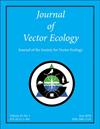Diapause influenced oviposition behavior and physical egg hatch cues of Aedes atropalpus (Diptera: Culicidae): traits that may influence successful colonization of riverine rock pools
Abstract
Mosquitoes have developed specialized oviposition strategies that allow them to develop in a wide variety of aquatic habitats. Environmentally cued hatching traits may also play an important role in the successful colonization of some larval habitats, but this subject has remained largely unexplored in Culicidae. Aedes atropalpus (Coquillett) is an autogenous rock pool specialist that may maintain unique adaptations for oviposition and egg hatching. We investigated the egg-laying strategies of Ae. atropalpus exposed to standard (non-diapausing) rearing conditions and diapause-inducing conditions and tested the impact of physical agitation on egg hatch rates by exposing floating and submerged eggs to physical agitation treatments. The results of the oviposition experiment indicate that Ae. atropalpus females primarily lay non-diapausing eggs directly onto the water surface and lay diapausing eggs directly on solid surfaces. The egg-hatching experiment demonstrated that physical agitation significantly increases Ae. atropalpus hatch rates. Floating and submerged eggs responded similarly to the agitation treatment. These data suggest that oviposition behaviors based on both egg diapause status and environmentally-cued hatching strategies may be important adaptations for Ae. atropalpus in riverine rock pools.


 求助内容:
求助内容: 应助结果提醒方式:
应助结果提醒方式:


